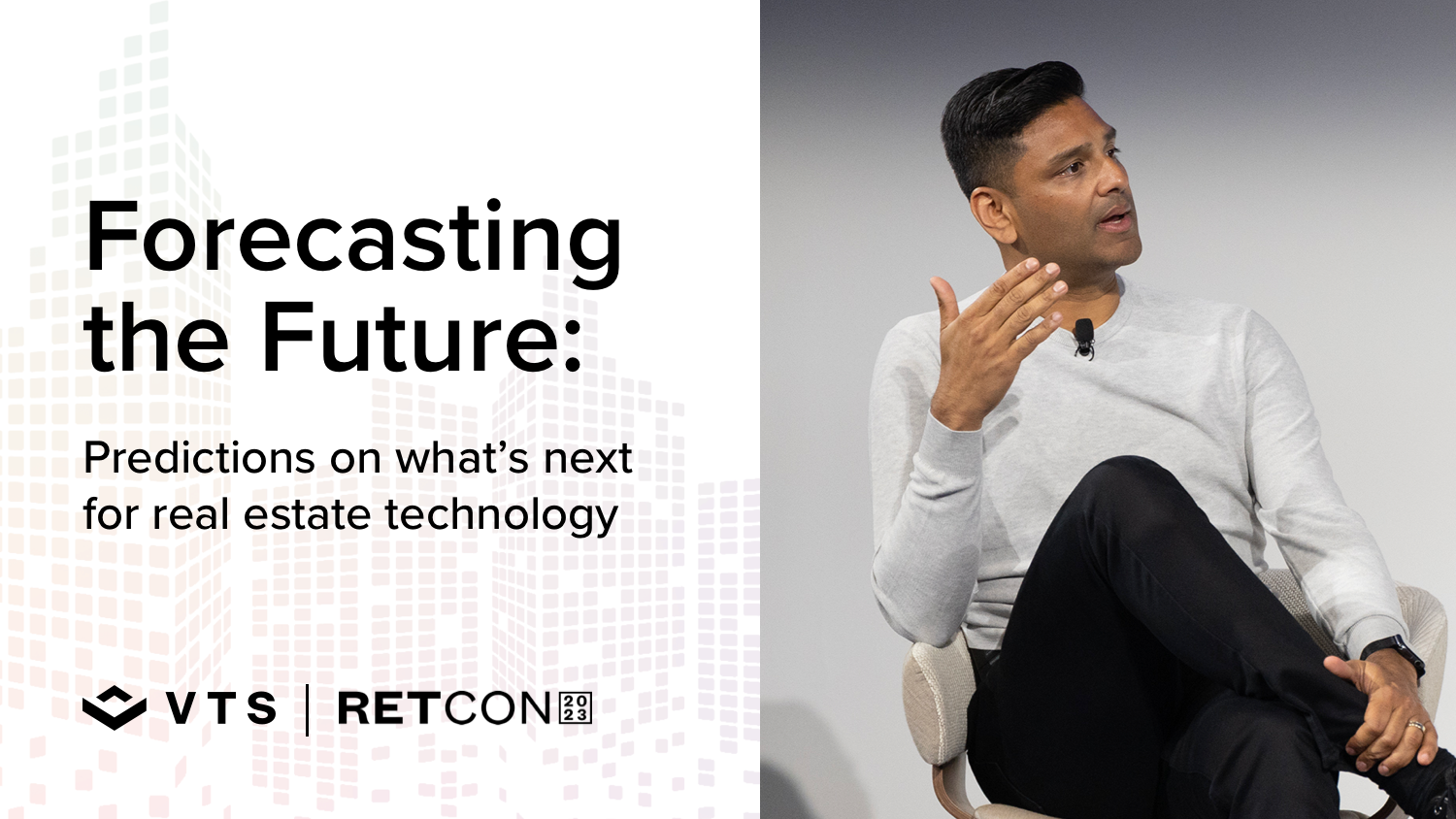
Commercial real estate has continued to evolve, spurred by forced changes brought on by the COVID-19 pandemic. This evolution has firmly cemented technology as an important role, helping CRE leaders remain competitive in a down economy and meet tenant expectations.
For this reason, it’s not surprising that 86% of landlords are investing in technology, either by adding new solutions to their tech stack or consolidating existing systems to create more operational efficiency. This shift in investment priorities shows just how important technology is to the future success of commercial real estate businesses.
Gijo Mathew, Chief Product Officer at VTS, discussed his thoughts on the what’s next for real estate technology at both Accelerate and RETCON 2023, focusing on how the latest innovations impact the market today, and in the months and years to come. Here are the highlights from those discussions, as the market moves forward, navigating the current economic climate.
Key takeaways from this blog:
- Technology innovation projects alone aren’t cutting it anymore and CRE firms are more carefully evaluating technology that will have a clear return on investment by driving growth or reducing inefficiencies
- Digitization of the workplace has already begun, and unlocking the potential of every asset with scalable technology is a prerequisite if owners want to be a part of that change
- Artificial intelligence (AI) and large language models (LLM) are game-changing technology, but for these tools to be useful in CRE, unlocking data is a key prerequisite
- Human behavior change management can be a barrier to investment in technology, which is why businesses are looking for a partner with domain expertise, not just a technology vendor
Careful evaluation of innovation is key
Technology evolution has skyrocketed in the last few years, with commercial real estate adopting new solutions at an unprecedented rate. And innovation is a key driver of technology; however, innovation alone isn’t enough to ensure success.
“Innovation isn’t cutting it anymore, and outcomes of tech solutions need to be proven more than ever,” Mathew said.
While a near majority of landlords are investing in CRE technology, innovation is not the top decision-making factor; return on investment is.
With the economy in its current state, investors are carefully evaluating what solutions to fund. Today, decisions are made by a panel of stakeholders who discuss potential tech investments, asking themselves:
- What problem is the product solving?
- Is this problem a major issue for the business?
- Is this solution nice to have or essential for remaining competitive?
The newest or most innovative technology may be a flashy addition to a business, but after deliberation, it may not be the solution to solve the business’s pain points.
Increasingly, CRE businesses are looking for solutions that come with an elevated level of support. Beyond successful implementation and initial training for the tool, leaders are looking for service providers who act as partners in technology.
This is especially important when modern landlords are experiencing barriers to internal adoption of new tech:
- 78% of landlords expressed that new tools aren’t integrated with existing technology
- 62% of landlords feel that new tools are too complex for internal stakeholders to adopt quickly
- 38% of landlords say brokers don’t receive enough training on new tools
This is why many firms are looking for service providers that act as partners in technology. A successful technology partnership includes implementing the tool, training users, continuous support services, and additional learning opportunities so that the solution is put to use at the highest possible level.
“Technology providers need to ensure that their clients are invested in success, making the partnership as beneficial as possible.”
New technologies depend on market data
Careful analysis of the latest technology is important to understanding how useful it can be for CRE, however, it’s current state may not tell the whole store. For example, artificial intelligence (AI) has become more and more mainstream, taking various industries by storm with ChatGPT — one of the more innovative AI solutions in recent years.
However, without having input from the incredibly nuanced commercial real estate sector, programs like ChatGPT doesn’t yet have the data needed to make inferences.
Mathew said, “these solutions are transformative but don’t yet have an accurate pulse on commercial or residential markets. They don’t have the capabilities to provide visibility to real-time data or market analytics.” However, as the AI tools are able to collect more and more data, Mathew is confident that AI will become a game changer in the CRE world.
The workplace is becoming increasingly dependent on digital technologies, and optimizing portfolios with technology that scales and grows is necessary. However, in an industry like commercial real estate, new-age technology can still be very dependent on the end user inputting information so it can learn. This adds another layer of consideration for stakeholders evaluating new solutions,
“AI will have a profound impact on the future of products and services,” said Mathew, adding that “it will improve how efficiently businesses are run and will unveil new ways of capturing data and analytics.”
Partnership, technology, and innovation
Implementing technology isn’t necessarily the biggest challenge in commercial real estate, it’s being able to mould the solutions to be applicable to the industry without adding additional work for internal teams.
“Building a digital infrastructure is essential,” Mathew said. “Integrating all applications of a building creates a tech-focused foundation for the asset, and ensures it can scale with new technologies into the future. It enhances the short and long-term value of the building.”
However, with technology on the rise, the number of solutions on the market is staggering. A good place to start, when adding technology to a portfolio, is with data integration and system consolidation.
Looking back at the data around the barriers to new technology, a lack of integration, simplicity, and training are gaps that cause the adoption of technology to fail. Firms can manage change and influence their team’s behaviors internally, but a partnership with a solutions provider ensures that every concern or roadblock is addressed, mitigated, and resolved.
“It’s important to have a simplified source of truth for your technology that is as easy to understand and straightforward as possible,” Mathew concluded. “Any great solution is only as good as the change it can bring to the organization. It’s not about just offering a solution, but a partnership with powerful change management support.”
Today, the challenging environment is creating an emphasis on moving from innovation for innovation’s sake to innovation in terms of business practices and financial wellness.
This shift will bring about more mature, future-focused companies. Leaders in commercial real estate who are carefully analyzing technology and building strong change management processes will see more thoughtful sales cycles, a highlighting of sustainable profitability, and a sharp turn towards long-term partnerships over set-it and forget-it tech.
Want to hear more from our experts and other industry leaders? Subscribe to Trading Paper, the official VTS podcast. From exclusive market data and how key industry players can leverage insights and win to what the new wave of modern tenant experience looks like, you'll find it in this podcast.






